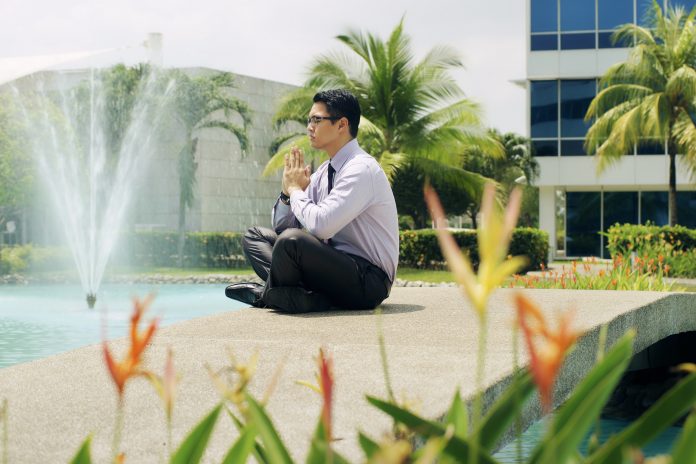Article #03
Introduction
Every human experience or emotion can be classified into two groups: pleasant and unpleasant. Meditation is an effective means of dealing with both equally. Whether you are feeling excited about something good that has happened to you or about something not-so-good that you have experienced, meditation can help maintain a balance in your mind and emotions. It also allows one to support a new level of enthusiasm when things are going well. Meditation also enables you to deal with unpleasant experiences or feelings in a much more calm and balance.
The Home Doctor – Practical Medicine for Every Household. The Only Book You Need When Help is Not On The Way
Brief history of meditation
Meditation has been used for thousands of years to help one relax, maintain peace of mind and body, focus on the present moment, develop spiritually and reach enlightenment. It is part of many religions such as Hinduism, Jainism, Buddhism, Sikhism, and Taoism. Meditation was introduced in the west during the 1960s by Swami Vishnudevananda, who founded Sivananda Yoga Vedanta Centres. Since then, there has been a growing interest in meditation, with many studies testing its benefits.
The integration of eastern meditative techniques into western lifestyles started only recently, resulting in vast amounts of scientific data that now prove the effectiveness of meditation.
What is meditation?
Meditation is a mental exercise that can help you have greater control of your emotions and feel more calm and balanced. The goal is to focus on the present moment to achieve inner peace. It involves controlling the breath, gradually relaxing different body parts, starting with muscles, and focusing on thoughts or images. Over time, it enhances one’s concentration and awareness. There are many types of meditation, including Sahaja yoga meditation (involving spontaneous movement), vipassana (focused attention), mantra (repeating names or words silently), mindfulness meditation (awareness of thoughts, feelings, bodily sensations), etc.
Learn more about: The Winning Mindset Improve Your Mindset Achieve Anything!!!
Simple step-by-step meditation Guide
- Step 1: Sit in a relaxed position, either in a chair or cross-legged on the ground. Keep your back straight and shoulders down.
- Step 2: Close your eyes and take a deep breath allowing your abdomen to expand, then exhale slowly. Repeat this for five breaths, then let all the air out of your lungs completely when you exhale.
- Repeat this several times until you feel more relaxed. At the same time, be attentive to any sounds around you, relax your muscles from head to toe while listening to background music, or observe changing patterns of light behind closed eyelids (visualization).
- Step 3: Focus on an object such as an image, candle flame or flower pot, etc., so that one’s attention is diverted from outside distractions. Please focus on the thing without trying to think about it, but simply looking at it or observing it in a relaxed manner.
- Step 4: Maintain your focus on the object for 10 seconds, then let go of the focus. Try not to worry if you lose your train of thought, as this is entirely normal. It may help to count each time you switch objects (1-10).
- Step 5: Continue this process for 20 minutes or longer. You can also increase your meditation time by 5 minutes every week until you reach 45 minutes per session, which is ideal for beginners. The best times are early morning before sunrise and late evening after sunset, but anytime during the day can be used, especially if one has difficulty sleeping at night. This is not a practice that requires strict rules, just simple guidelines to help you develop your meditation skills.
Learn more about: Relaxing Music – Meditation Music
11 health benefits of meditation
Better Focus
Meditation being an exercise, is aimed to help you have greater control of your thoughts. It enables you to focus by silencing the mind chatter and bringing awareness to the present moment to develop their inner faculties, energy levels, and intuition. Meditation is a skill that can be acquired to improve concentration for being more efficient at work or in school. People who have begun practicing meditation have shown noticeable improvements by becoming more productive with their time.
Regular meditators can multi-task while staying focused on their primary activity instead of working on several things at once without properly completing any particular job. Hence, it leads to increased productivity and satisfaction with life as one feels more connected with self and others, causing happiness and peace of mind. Meditation is helpful in every sphere of one’s life to handle stressful situations without anxiety or fear. It also helps to become more compassionate towards others and be non-judgmental about them.
Learn more about: Aromatherapy First Aid Kit
Decrease stress
Meditation is a natural antidote to stress. It helps one relax by increasing their oxygen intake resulting in the release of endorphins (positively charged proteins) which assist in counteracting cortisol (stress hormones). Many scientific studies have shown that meditation decreases stress, lowers blood pressure, and boosts the immune system. Meditation also strengthens concentration abilities even when you are not meditating by increasing awareness about your thoughts and emotions not disturbing you while working or at school.
People who practice meditation find the strength to deal with difficult situations without losing their temper, developing an anxiety disorder, or depression. Hence, it enhances an individual’s integrity and self-esteem, making them happier with life. Meditation also increases mental clarity and creativity, helping one think out of the box, see things in a new light and be more innovative in work or school. Meditation enables you to focus on your goals and motivates you to follow them with more incredible determination.
Improve attention span
Meditation helps you to be more attentive. It sharpens your concentration level by developing a powerful flow of awareness, which improves one’s attention span and focuses on tasks related to work or school.
With growing age, the brain’s ability to process information reduces due to a lack of oxygen. Regular practice of meditation not only does it reduce stress but also increases blood circulation-boosting energy levels by pumping fresh oxygen-rich blood throughout the body. This helps people undergo life challenges with more extraordinary tenacity as they are less sensitive about negative situations. Such persons experience happiness within themselves, enabling them to think more clearly about the problems they are facing.
Meditation offers a healthy way to rewire your brain from the inside out. With regular meditation practice, you will notice yourself feeling calmer and more focused in all kinds of situations. You will have increased concentration levels enabling you to study better for exams, learn new skills, and process information quickly with greater accuracy. According to research conducted by Harvard scientists, mindfulness can rebuild the brain mechanisms responsible for emotion regulation and mental focus, which offer a fantastic way to improve performance at work or school.
Learn more about: The Defense Bracelet
Emotional regulation
Meditation has a fantastic way of rewiring your brain for emotional regulation and monitoring your emotions without being carried away by their results in greater mental clarity, enabling you to think more logically about any given situation. You will be less moody with increased levels of patience, making it easier for you to deal with people around you.
Regular meditation practice helps one experience reduced stress coupled with increased happiness, which can be seen on the person’s face. People who have undergone mindfulness training have reported a substantial decrease in depression, anxiety, stress & pain. Meditation is scientifically proven as an effective way to manage unhealthy habits like smoking, drinking, overeating, etc., by regulating emotions, dealing with cravings, and breaking habitual responses that are not helpful. It offers a healthy way to handle difficult situations empowering individuals to break free from limiting beliefs and behaviors, increasing life satisfaction and fulfillment.
Improve Sleep
People who regularly practice meditation sleep better than those who don’t. Meditation is a fantastic way to go deep within yourself and break away from stress, anxiety & depression, which are the primary reasons for insomnia. With regular mindfulness practice, people tend to feel calmer in their daily lives, enabling them to focus on the tasks at hand. People fighting addiction also find it very effective as it helps overcome cravings associated with habits like nicotine craving & decreasing drug abuse.
You don’t have to be a monk, yogi, or guru to begin your meditation practice. You can take 20 minutes of your time every day to improve the quality of your life. Meditation is scientifically proven to be beneficial regarding the health of your mind, body, and spirit. It can easily fit into one’s daily life by simply taking 20 minutes from your busy schedule every day.
Help blood pressure
Stress is one of the main reasons for high blood pressure, which results in many other serious health problems. You will be surprised to know that meditation provides a healthy way of coping with stress. Regular practice of mindfulness helps people feel more relaxed about situations they are facing and enables them to think clearly about finding a solution for a given problem.
Meditation has been scientifically proven as an effective way to lower blood pressure by reducing stress levels, leading to an individual’s overall wellness and vitality. Meditation helps manage mental & emotional conditions like anger, depression, anxiety, etc., due to increased connectivity between brain regions responsible for sensory awareness, calmness & physical body. Regular practice optimizes your moods, making you feel happy each day.
People who regularly practice mindfulness report better sleep, lower blood pressure, an increase in energy levels, and a calmer & happier state of mind. It encourages the development of new skills and processes information quickly with greater accuracy.
Mental Discipline
Mindfulness is scientifically proven as an effective way to manage difficult emotions such as anger, anxiety, depression, etc. It helps develop a better understanding of yourself, providing you the power to understand your feelings and reactions. This enables individuals to be more proactive regarding their daily lives at work, school, or home.
Regular mindfulness practice helps develop mental discipline by enabling practitioners to identify thoughts that hinder a healthy lifestyle. People who regularly practice this form of meditation have shown significant reductions in their psychological distress levels, which provides them with a sense of well-being.
You can even begin with simple sitting meditation. This ancient practice of mindfulness is highly effective due to its simplicity and ability to produce noticeable results within a short period of ten days by decreasing stress levels benefiting mental and physical health.
Reduce depression
In a world where stress levels are at an all-time high, the need for effective ways to cope with it is equally essential. Mindfulness meditation has been scientifically proven as one of the best and most effective ways to manage difficult emotions such as anger, anxiety & depression.
Cognitive therapy is considered particularly helpful in managing depressive disorders through mood monitoring and recognizing early warning signs, enabling individuals to take appropriate actions against them. It has been reported that regular lifestyle meditations can help reduce depressive symptoms by nearly 40%.
Meditation has proved beneficial regarding mental health due to its ability to regulate pain perception, thus improving the overall well-being of individuals suffering from chronic pain conditions. The majority of patients who regularly practice meditation have shown significant reductions in their pain levels and improvements in physical functioning, general health, vitality, and social interaction.
Increase positive feelings
People who regularly practice meditation have reported significant improvements in their positive feelings by increasing their psychological well-being. It has been observed that practicing mindfulness can increase happiness levels and also improve cognitive function because it reduces distracting thoughts by enhancing attentional control, thus enabling individuals to focus on the present moment.
Mindfulness meditation has been scientifically proven beneficial for increasing positive emotions by reducing negative ones like anger, anxiety & depression. Due to increased connectivity between brain regions responsible for sensory awareness, calmness & physical body with regular practice optimizes your moods, making you feel happy each day. Improved cognitive function due to reduced distracting thoughts with common practice can help improve attention span & cognition, providing a sense of clarity to make better decisions, thus making you feel happier.
Increase compassion
Increase compassion towards yourself & others by practicing mindfulness meditation regularly. By being in tune with your emotions, you can learn to understand them more clearly, which results in a deep sense of calmness.
People who practice mindful meditation daily have been shown to possess increased levels of self-compassion and positive relationships, thus making them feel better about the way they interact with themselves and others in their lives. It also helps decrease emotional exhaustion over time by increasing your inner capacity for care, empathy & forgiveness with a sense of self-acceptance.
Meditation has been proven to increase compassion towards oneself & others by growing levels of self-compassion. By being in tune with your emotions, one can understand them more clearly, resulting in a deep sense of calmness.
Reduce Anxiety
Compared to other therapies, meditation is considered effective in managing social anxiety disorder and panic attacks. Meditation provides added benefits such as improved mood and focus levels by reducing stress levels overall.
It has been found that regular mindful meditations can help with several symptoms associated with anxiety disorders like compulsive behavior & negative thoughts, thus considerably decreasing episodes of panic attacks along with feelings of nervousness or uneasiness in various situations. Social anxiety disorder is characterized by extreme distress in social settings due to the fear of embarrassment or possible unfavorable judgment from others.
Meditation has been proven beneficial when it comes to reducing social phobias that are characterized by extreme distress in social settings due to feelings of embarrassment or possible unfavorable judgment from others. By increasing self-esteem, one can have lower scores for social phobia, thus making them feel more confident about themselves and their abilities.
Conclusion
There are a lot of benefits associated with mindfulness meditation. Regular practice for a few months can bring about significant improvements in many aspects of an individual’s life, making them feel better at work & home. By incorporating it as a part of your lifestyle, you will experience positive effects on the mind, body, and soul as a whole. This is why mindfulness has been scientifically proven beneficial for those who wish to enhance their overall well-being by working on their emotional, psychological, and physical health from within using meditation as one of its major components. It is beneficial for all people regardless of age, sex, culture, or health status.
One must understand that meditation shouldn’t be considered as a short-term fix to bring about immediate results. It’s essential to practice daily (even if it’s just 5 minutes), intending to become more aware. Mindfulness is not about achieving complete stillness; instead, it requires one to focus their attention on whatever thoughts come up without being judgemental or critical towards themselves, which brings peace & awareness.
- To Learn more about Meditation, Chakras & Solfeggio Frequencies, Click Here
- To Learn more about Meditation & Essential oils, Click Here
- To Watch Relaxing Videos while meditate, Click Here
Read more >>
>> Relaxing Rain Sounds to reduce stress & help with insomnia
>> Top Ten Guitar Books for Beginners 2022
>> The Best Gaming Computer under 1400
>> The Best Routers under $100
>> Best Laptops for Writers under $300
>> What is the Science Behind Solfeggio Frequencies?




